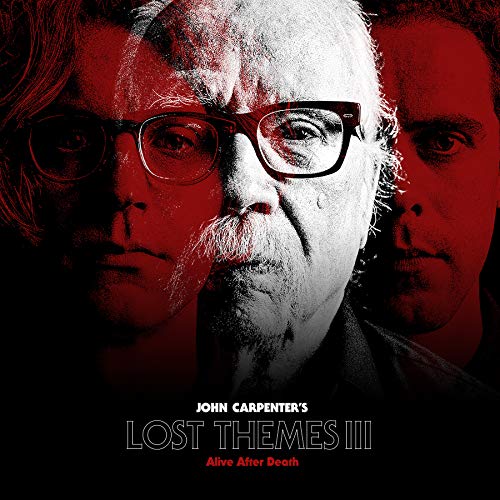
John Carpenter
Lost Themes III: Alive After Death
Release Date: Feb 5, 2021
Genre(s): Electronic
Record label: Sacred Bones
Music Critic Score
How the Music Critic Score works
Buy Lost Themes III: Alive After Death from Amazon
Album Review: Lost Themes III: Alive After Death by John Carpenter
Very Good, Based on 6 Critics
Based on rating 8/10
Though John Carpenter has described all of his Lost Themes albums as imaginary soundtracks, Lost Themes III: Alive After Death might come even closer than Lost Themes II did to resembling an actual score. This might be due to Carpenter, his son Cody, and godson Daniel Davies recording new versions of his movie music on 2017's Anthology: Movie Themes 1974-1998 and then touring in support of it, but at any rate, Lost Themes III's ebb and flow of interludes and set pieces has a cohesion that rivals his soundtracks. Carpenter delivers wonderfully spooky atmospheres on tracks like "Turning the Bones" and "Dripping Blood," a moment of somber, introspective beauty that stands in contrast to its Grand Guignol title.
Based on rating 7
Sadly it's been a good while since we've seen horror maestro John Carpenter behind the camera, but luckily he's had something of a renaissance through his score work. Working with Sacred Bones Records, his son Cody and godson Daniel, Carpenter has found new life as a gigging musician, creating sinister soundscapes that wouldn't feel out of place on his 80s filmography. This third volume fits perfectly in with his previous work, brooding synths and grinding basslines propelling each track - but there's a shift to modernity too.
Based on rating 7/10
Continuing his late-career resurgence as a creative musical force, famed horror director/composer John Carpenter has released his third album of free-standing original music, Lost Themes III: Alive After Death. A collection of original scores for films that don't actually exist, the series offers the fun of imagining all the standard horror imagery from the Carpenter-verse its music could accompany: moonlit suburban streets awash in fog, creepy graveyards, even the signature Albertus typeface Carpenter used for all his credits -- a sort of free-associative fugue of '80s horror tropes (developed and codified to no small degree by Carpenter himself of course). While this third entry could be classified as largely more of the same, there's enough freshness here to warrant a closer look, especially if you're already a fan of the project.
Based on rating 3.5
The third full length album of dystopian disco by John Carpenter, in his Lost Themes franchise, as oddly thrilling as it is, finds the acclaimed director getting a little lost as he navigates the pitfalls of his own mythology. The issue isn't the quality of music contained within, as it's yet another hyper polished and gratifyingly nimble selection of intimidating ’80s maximalist electro that would elevate any soundtrack it found itself on, even though it’s been made clear these tracks weren't specifically built for cinematic usage. The problem is, in a cultural landscape so obviously seeped in his slasher fierce aesthetic, it's almost exactly what we'd come to expect from a Carpenter project, ultimately robbing us of any actual innovation or shock value.
Based on rating 6.1/10
For years, John Carpenter was thought of more like a session musician than a serious artist--a slick and sturdy genre craftsman, more of a cult icon than a name brand. That's all changed in the last decade as he's become thoroughly deified as the untouchable and exalted Master of Horror, and without even returning to the director's chair. Carpenter's shadow falls over much contemporary American genre cinema and extends internationally too, from the recent Brazilian political thriller Bacurau to the über-stylish movies of Bertrand Bonello, who composes the electronic soundtracks for his elegant French riffs on American genre formulas just like his idol.
Opinion: Excellent
Considering that a filmmaker's creative concerns are similar to the ones that come up when stitching together a solid album, you wouldn't expect the shift from film to music to be such a big jump. In reality, the list of successful directors turned musicians is a relatively short one. While a few directors have had a good go at it (David Lynch, Charlie Chaplin), John Carpenter has been transmitting his visions through music since the late 70s.
'Lost Themes III: Alive After Death'
is available now

